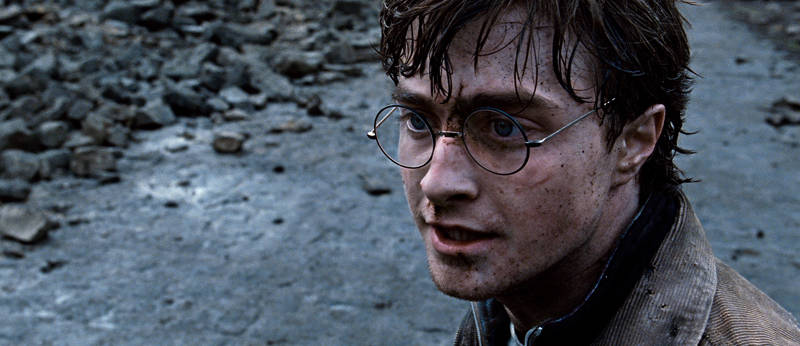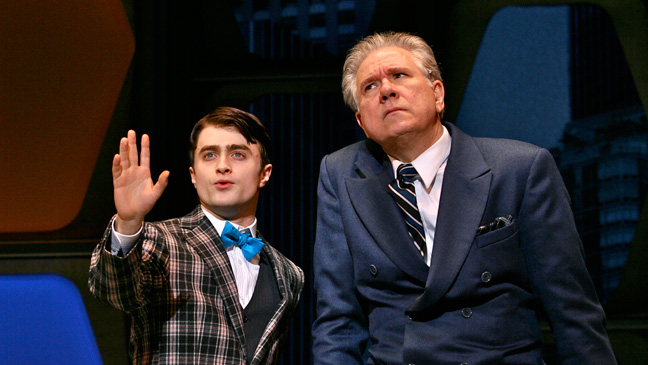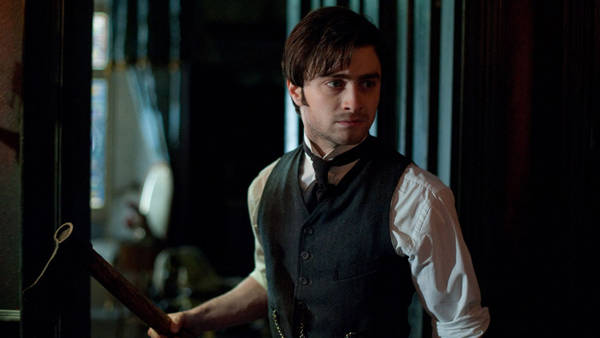Life After Potter: Can Daniel Radcliffe Succeed?
2011 may not have been the greatest year for films or theater attendance, but it does have the distinction of being the last year we saw a "Harry Potter" film savage the box office. After a decade of films and a dynasty forged, the series that many had grown with was over, bringing about an end that could be described as bittersweet not only for audiences, but also series star Daniel Radcliffe. Having spent the bulk of his career (not to mention childhood) playing the same character, the question of whether or not Radcliffe would survive being forever branded "Harry Potter" was one that had been asked well before the last film debuted. In a move of foresight, around the time "Order of the Phoenix" hit theaters, Radcliffe starred in a revival of the play Equus—when he was 17 no less—to strong reviews that praised his going against type. In a single stroke (no pun), he had given fans a glimpse that he took his career beyond "Potter" seriously, not content to live on the mountains of cash he had earned before turning 21. Although he continued to impress onstage with the Broadway revival of How to Succeed in Business Without Really Trying, his film longevity is about to be put to the test with The Woman in Black. In the film, Radcliffe plays a young lawyer, Arthur Kipps, who travels to the English countryside to settle the effects of recently deceased Alice Drablow. Upon arriving, he learns that the parents of the village have taken to locking the children away in their homes, afraid they will disappear and die after a number of unexplainable events occur around town. When Kipps takes up residency in the abandoned Drablow home, he experiences several supernatural events centered around the Woman in Black, a vengeful spectre whose purpose is unclear but is linked to the events haunting the village.Radcliffe's first high-profile project since the "Potter" series is not an uninteresting one. When you think of the guy, your mind doesn't jump to horror. And yet, "Black" could be a perfect jumping off point for the burgeoning actor, who's clearly aiming to prove his versatility. He can already compete on the Broadway and London stage, not to mention lead a film franchise into billions. Now he wants us to know he can do horror.
Although he continued to impress onstage with the Broadway revival of How to Succeed in Business Without Really Trying, his film longevity is about to be put to the test with The Woman in Black. In the film, Radcliffe plays a young lawyer, Arthur Kipps, who travels to the English countryside to settle the effects of recently deceased Alice Drablow. Upon arriving, he learns that the parents of the village have taken to locking the children away in their homes, afraid they will disappear and die after a number of unexplainable events occur around town. When Kipps takes up residency in the abandoned Drablow home, he experiences several supernatural events centered around the Woman in Black, a vengeful spectre whose purpose is unclear but is linked to the events haunting the village.Radcliffe's first high-profile project since the "Potter" series is not an uninteresting one. When you think of the guy, your mind doesn't jump to horror. And yet, "Black" could be a perfect jumping off point for the burgeoning actor, who's clearly aiming to prove his versatility. He can already compete on the Broadway and London stage, not to mention lead a film franchise into billions. Now he wants us to know he can do horror. When looking behind the scenes, Radcliffe may have chosen a project that has great capacity for success. The script comes from Jane Goldman, who has penned or co-penned scripts for longtime collaborator Matthew Vaughn (Kick-Ass, X-Men: First Class). The director, James Watkins (Eden Lake) is a rising (but still unknown) star in British horror who has a love for old-school ghost stories. The film looks to be focused more on atmospheric horror (the current hot thing) over blood and gore. Plus, it's rated PG-13 and has a 95-minute run time, both of which make it easier to fill theater seats and screen more showings.It isn't a question of whether or not "Black" will be a financial success; with a budget of only $13 million, it certainly will. The real question is if Radcliffe will fall victim to the machine that is typecasting. The term is a vice for anyone who works in performing arts: to be branded as only being able to produce one kind of role/effect. In the case of Radcliffe, he was synonymous with the top-grossing series of all time. Now he is headlining a film whose total budget likely cost one day's worth of shooting for a "Potter" film. Instinctively, audiences don't quite "click" with the image.
When looking behind the scenes, Radcliffe may have chosen a project that has great capacity for success. The script comes from Jane Goldman, who has penned or co-penned scripts for longtime collaborator Matthew Vaughn (Kick-Ass, X-Men: First Class). The director, James Watkins (Eden Lake) is a rising (but still unknown) star in British horror who has a love for old-school ghost stories. The film looks to be focused more on atmospheric horror (the current hot thing) over blood and gore. Plus, it's rated PG-13 and has a 95-minute run time, both of which make it easier to fill theater seats and screen more showings.It isn't a question of whether or not "Black" will be a financial success; with a budget of only $13 million, it certainly will. The real question is if Radcliffe will fall victim to the machine that is typecasting. The term is a vice for anyone who works in performing arts: to be branded as only being able to produce one kind of role/effect. In the case of Radcliffe, he was synonymous with the top-grossing series of all time. Now he is headlining a film whose total budget likely cost one day's worth of shooting for a "Potter" film. Instinctively, audiences don't quite "click" with the image. However, that isn't to say audiences shouldn't be given a little credit. There has been a growing awareness of typecasting, some of which we embrace wholeheartedly. Michael Bay will keep blowing crap up, Megan Fox can't out-act a wooden post and Meryl Streep will never, ever disappoint—even if the movie itself is bad. The fact that audiences are aware of these perceptions are a first step to potentially altering them. Before we can accept Radcliffe in roles outside of the "Potter" films, he has to help us believe. He has to make the smart choices both on and off-screen and continue to grow professionally. So far, it would seem he has made quiet, yet effective steps towards a long career.
However, that isn't to say audiences shouldn't be given a little credit. There has been a growing awareness of typecasting, some of which we embrace wholeheartedly. Michael Bay will keep blowing crap up, Megan Fox can't out-act a wooden post and Meryl Streep will never, ever disappoint—even if the movie itself is bad. The fact that audiences are aware of these perceptions are a first step to potentially altering them. Before we can accept Radcliffe in roles outside of the "Potter" films, he has to help us believe. He has to make the smart choices both on and off-screen and continue to grow professionally. So far, it would seem he has made quiet, yet effective steps towards a long career.
It only helps that his personal life isn't a tabloid mess, his various TV appearances (such as recently hosting Saturday Night Live) are well-recieved and he spends a great deal of time working with The Trevor Project, a suicide prevention hotline aimed at helping at-risk LGBT youth. All of these actions and more factor into a strong, positive image in the public eye for Radcliffe. In the end, if we like the guy, we're willing to give him the opportunity to break off and become more than The Boy Who Lived.


